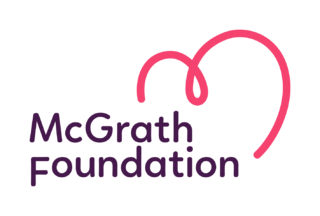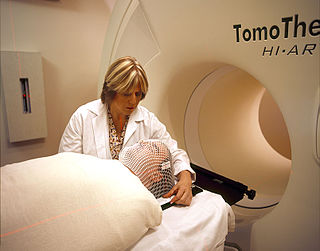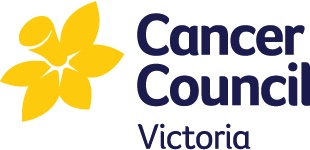Related Research Articles

Cancer is a group of diseases involving abnormal cell growth with the potential to invade or spread to other parts of the body. These contrast with benign tumors, which do not spread. Possible signs and symptoms include a lump, abnormal bleeding, prolonged cough, unexplained weight loss, and a change in bowel movements. While these symptoms may indicate cancer, they can also have other causes. Over 100 types of cancers affect humans.
Terminal illness or end-stage disease is a disease that cannot be cured or adequately treated and is reasonably expected to result in the death of the patient. This term is more commonly used for progressive diseases such as cancer or advanced heart disease than for trauma. In popular use, it indicates a disease that will progress until death with near absolute certainty, regardless of treatment. A patient who has such an illness may be referred to as a terminal patient, terminally ill or simply as being terminal. There is no standardized life expectancy for a patient to be considered terminal, although it is generally months or less. Life expectancy for terminal patients is a rough estimate given by the physician based on previous data and does not always reflect true longevity. An illness which is lifelong but not fatal is a chronic condition.

The University of Texas MD Anderson Cancer Center is a comprehensive cancer center in Houston, Texas. It is the largest cancer center in the U.S. and one of the original three comprehensive cancer centers in the country. It is both a degree-granting academic institution and a cancer treatment and research center located at the Texas Medical Center in Houston. It is affiliated with The University of Texas Health Science Center at Houston.

The Royal Melbourne Hospital (RMH), located in Parkville, Victoria, an inner suburb of Melbourne, is one of Australia's leading public hospitals. It is a major teaching hospital for tertiary health care with a reputation in clinical research. The hospital is managed as part of Melbourne Health which comprises the Royal Melbourne Hospital, North West Dialysis Service and North Western Mental Health. The Melbourne Health Chief Executive is Christine Kilpatrick AO.
District Nurses work in the United Kingdom's National Health Service, managing care within the community and lead teams of community nurses and support workers. The role requires registered nurses to take a NMC approved specialist practitioner course. Duties generally include visiting house-bound patients and providing advice and care such as palliative care, wound management, catheter and continence care and medication support. Their work involves both follow-up care for recently discharged hospital inpatients and longer term care for chronically ill patients who may be referred by many other services, as well as working collaboratively with general practitioners in preventing unnecessary or avoidable hospital admissions.

Mary Louise Newling Wooldridge is a former Australian politician. She was a Liberal Party member of the Parliament of Victoria from 2006 to 2019. She was a member of the Victorian Legislative Assembly, representing the seat of Doncaster from 2006 to 2014; her seat was abolished in a redistribution for that year's election, and she was subsequently elected to the Victorian Legislative Council for Eastern Metropolitan Region in November's state election.
End-of-life care (EoLC) refers to health care for a person nearing the end of their life or in the advanced stage of a terminal illness. Generally speaking, people who are dying need care in four areas—physical comfort, mental and emotional needs, spiritual issues, and practical tasks.

Maxine Veronica Morand is an Australian academic, advocate for cancer patients, and former politician. Morand has a current academic appointment at Monash University where she is a professorial fellow in the School of Public Health and Preventive Medicine. In addition she is a board director at Inner East Community Health and is the chair of the Peter MacCallum Cancer Centre.

The McGrath Foundation is a breast cancer support and education charity in Australia, which raises money to place McGrath Breast Care Nurses in communities across Australia and increase breast health awareness. The charity was founded by Australian cricket player Glenn McGrath and his English-born wife, Jane McGrath, in 2005, following Jane's initial diagnosis and recovery from breast cancer. Jane died on 22 June 2008 at the age of 42.

The American Academy of Hospice and Palliative Medicine (AAHPM) is a professional organization for physicians specializing in Hospice and Palliative Medicine, headquartered in Chicago, Illinois. Membership is open to all health care providers committed to improving the care of patients with serious or life-threatening illnesses. AAHPM has more than 5,200 members; 82 percent are physicians, 12 percent are nurses or other health care providers and 6 percent are residents or students.
Hospice care is a type of health care that focuses on the palliation of a terminally ill patient's pain and symptoms and attending to their emotional and spiritual needs at the end of life. Hospice care prioritizes comfort and quality of life by reducing pain and suffering. Hospice care provides an alternative to therapies focused on life-prolonging measures that may be arduous, likely to cause more symptoms, or are not aligned with a person's goals.

Cancer can be treated by surgery, chemotherapy, radiation therapy, hormonal therapy, targeted therapy and synthetic lethality, most commonly as a series of separate treatments. The choice of therapy depends upon the location and grade of the tumor and the stage of the disease, as well as the general state of the patient. Cancer genome sequencing helps in determining which cancer the patient exactly has for determining the best therapy for the cancer. A number of experimental cancer treatments are also under development. Under current estimates, two in five people will have cancer at some point in their lifetime.

Cancer Council Victoria is a not-for-profit organisation which aims to reduce the impact of cancer in Victoria. It is an independent body that advises various groups, including government, on cancer-related issues. Cancer Council Victoria also conducts and funds cancer research, acts as an advocate for cancer patients and their families, and runs cancer prevention, education and support programs.
Gibbs Cancer Center & Research Institute is a cancer treatment and research facility in Upstate South Carolina. Gibbs Cancer Center is associated with the NCI Community Cancer Centers Program and the Medical University of South Carolina. Gibbs headquarters is located on the campus of the Spartanburg Medical Center (SRMC) in Spartanburg, SC.

The Edinburgh Cancer Research Centre (ECRC), also known as the Cancer Research UK Edinburgh Centre and the University of Edinburgh Cancer Research Centre, is a center for basic, translational and clinical cancer research located in Edinburgh, Scotland. ECRC constitutes a part of the Institute of Genetics & Molecular Medicine (IGMM) and is positioned in direct proximity of the Western General Hospital, where most of its clinical activities take place.
Pallium India is a national registered charitable trust formed in 2003 aimed at providing quality palliative care and effective pain relief for patients in India. Dr. M. R. Rajagopal is the founder and chairman of Pallium India. Pallium India works in collaboration with several national and international organisations to improve the accessibility and affordability of pain relief drugs (opioids) and other low-cost medicines, to ensure the availability of palliative care services in India and to improve the quality of palliative care services provided by the healthcare and allied health care professionals. In February 2016, Pallium India was accredited by Social Justice Department of Government of Kerala.

The Binaytara Foundation (BTF) was established in 2007 by Dr. Binay Shah and wife Tara Shah with the goal of promoting health and education in underprivileged societies. The BTF is a Washington State nonprofit organization exempt from taxation pursuant to Section 501(c)(3) of the Internal Revenue Code. At the 37th plenary meeting held July 18, 2013, the United Nations Economic and Social Council (ECOSOC) decided to grant special consultative status to the BTF. The ECOSOC grants special consultative status to NGOs that are concerned specifically with only a few of the fields of activity covered in ECOSOC and bears special competence in that field. BTF has founded multiple programs in underdeveloped and developing countries to improve access to healthcare. Recent accomplishments include developing home hospice and palliative care in India and Nepal, and the first bone marrow transplant center in Nepal.

On 29 November 2017, Victoria became the first Australian state to pass legislation allowing assisted suicide. The law gives anyone suffering a terminal illness, with less than six months to live, the right to end their life. The law had an 18-month implementation period, and came into effect on 19 June 2019.
Margaret Ruth Redpath AO is a retired Australian surgeon and radiation oncologist. She worked as a palliative care pioneer in Australia and the United Kingdom. She has also been a senior priest in the Anglican Church of Australia, particularly at St Paul's Cathedral, Melbourne. Redpath was awarded the Order of Australia medal and awarded a Doctor of Medical Science by the University of Melbourne.
Raymond Javan Chan is an Australian oncology nurse, clinical trialist, researcher, and senior administrator. He is a NHMRC Investigator Fellow and a Professor of Cancer Nursing, jointly appointed by Princess Alexandra Hospital, Metro South Health and Queensland University of Technology.
References
- ↑ Ridnell, Jonathan (7 March 2014) We've come a long way baby - Doreen Akkerman talks IWD, ABC Central West. Retrieved 21 November 2018.
- ↑ (29 January 2010) Cancer Council Victoria farewells a national treasure, Cancer Council Victoria. Retrieved 21 November 2018.
- ↑ (2012) White, Victoria M; MacVean, Michelle L; Grogan, Suzi; D'Este, Catherine; Akkerman, Doreen; Ieropoli, Sandra; Hill, David J; Sanson-Fisher, Robert; Can a tailored telephone intervention delivered by volunteers reduce the supportive care needs, anxiety and depression of people with colorectal cancer? A randomised controlled trial, Psycho-Oncology , Vol. 21, No 10, pp 1053-1062. Accessed 21 November 2018.
- ↑ (2010) Ieropoli S; White V; Jefford M; Akkerman D, What models of peer support do people with colorectal cancer prefer? European Journal of Cancer Care . Accessed 21 November 2018.
- ↑ (2007) Morra ME; Thomsen C; Vezina A; Akkerman D; Bright MA; Dickens C et al. The International Cancer Information Service: a worldwide resource. Journal of Cancer . Accessed 21 November 2018.
- ↑ (2005) Jefford M; Black C; Grogan S; Yeoman G; White V; Akkerman D, Information and support needs of callers to the Cancer Helpline, The Cancer Council Victoria. European Journal of Cancer Care, p113-123. Accessed 21 November 2018.
- ↑ (2002) Roberts S; Schofield P; Freeman J; Hill D; Akkerman D; Rodger A, Bridging the information and support gap: evaluation of a hospital-based cancer support nurse service, Patient Education and Counselling; p7-55. Accessed 21 November 2018.
- ↑ (2000) Hordern, A and Akkerman, D, Sexuality and breast cancer - addressing the taboo subject. Cancer Forum, Volume 24, No 2, p165-8. Accessed 21 November 2018.
- ↑ Award extract: AKKERMAN, Anne Doreen, Australian Honours Search Facility, Department of Prime Minister and Cabinet, Australian Government. Accessed 21 November 2018.
- ↑ (April 2010) Women's health campaigner honoured, Victorian Government. Retrieved 21 November 2018.